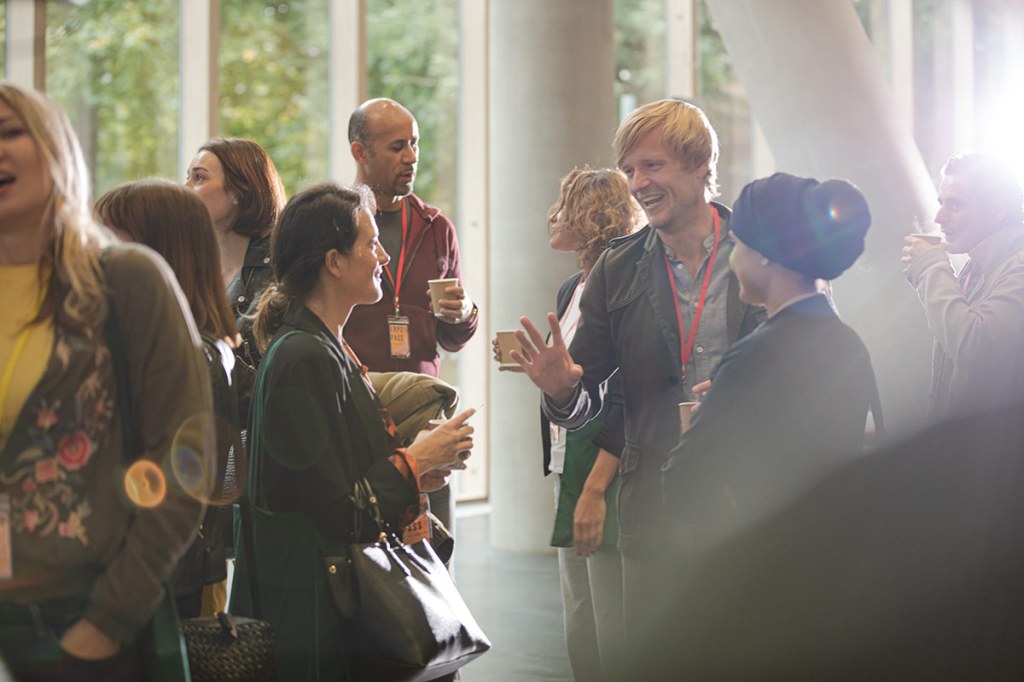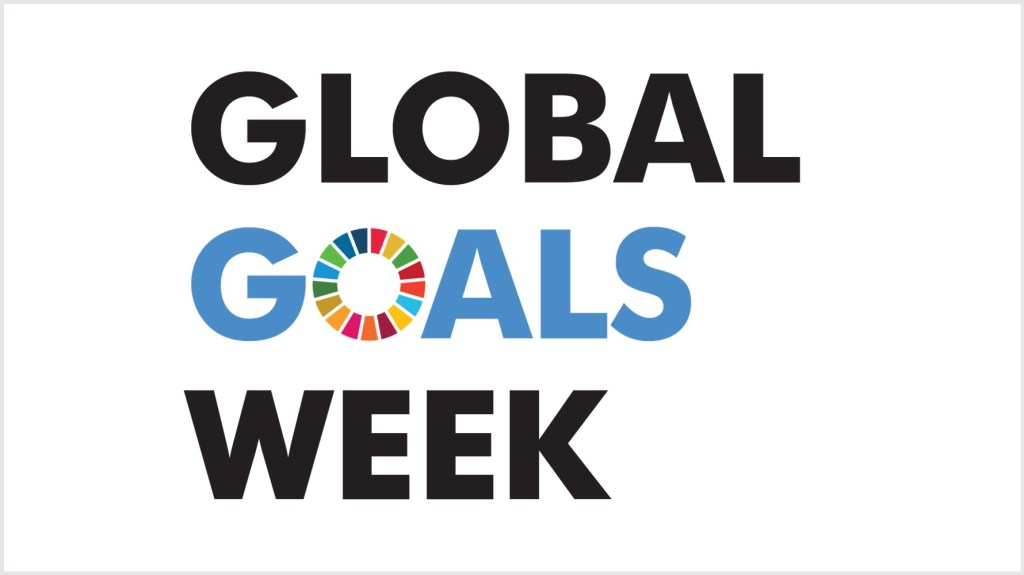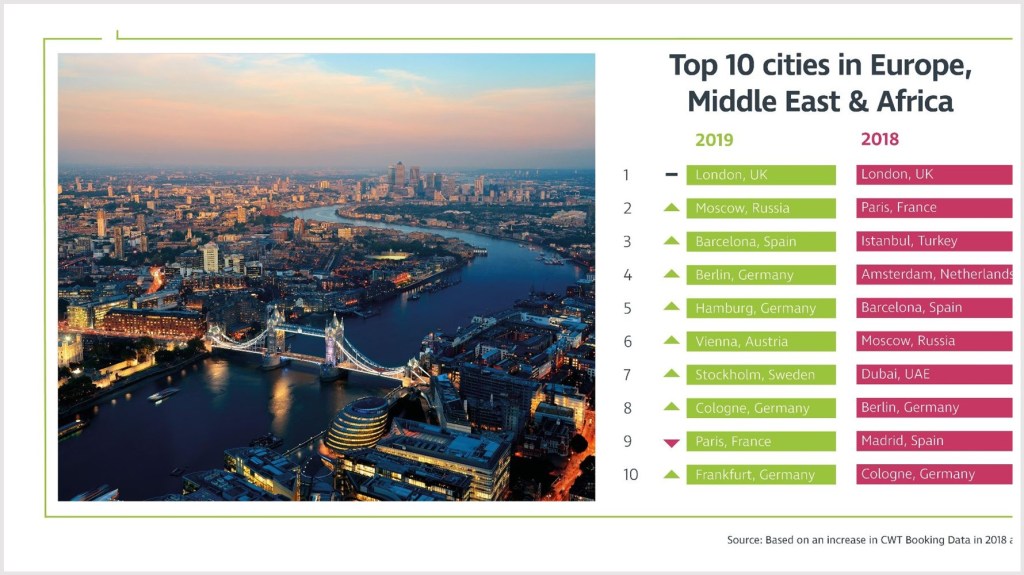Introducing the latest myCWT product and service enhancements
Building on our digital, omnichannel myCWT platform, our new products and services will simplify travel management for you and your employees – anytime, anywhere, anyhow.
Note: Featured services may not be available in your country at this time. Please reach out to your CWT representative for more details.
Hear from Chief Product Officer, Erica Antony as she shares the key product highlights of 2024, along with the key areas driving innovation.
-

2040: Baseline, Boom or Bust
As we enter an era of rapid transformation and unprecedented challenges, it is essential for travel managers, meeting & event planners, and corporate decision-makers to look ahead and frame our current strategic thinking with a clear vision of the future. Business travel and meetings and events (M&E) are poised for significant change over the next decade and a half, driven by a complex interplay of sustainability goals, technological advancements, evolving work models, and geopolitical dynamics.
In this paper to mark the 10th anniversary of our Global Business Travel Forecast, we explore, for the first time, a long-term vision of the future and potential trajectories through three distinct scenarios, each offering insights into how these forces should affect policy-making, budgeting and priorities. By examining these scenarios, we can better understand the diverse possibilities that lie ahead and the strategic imperatives required to thrive in each potential future.
Based on trajectory data analysis and interviews with industry leaders, behaviorists and climate tech founders, this forward-looking approach enables us to anticipate changes, strengthen our strategies, and make informed decisions that align long-term objectives. It is through this lens of foresight and adaptability that we can build resilience, seize opportunities, and navigate the complexities of the future.
We invite you to reflect on the insights presented, and consider how your organization can prepare for the opportunities and challenges that lie ahead. Together we can ensure that travel and meetings remain catalysts for growth, scalability and sustainable practices.
- Scenario development is both an art and a science
- Megatrends Shaping the Future of Business Travel, Meetings and Events
- Sustainability goals the new crux of corporate policy
- Technology Revolutionizes Travel Management
- Modern work models spark new travel patterns
- Changing demographics open doors to new opportunities
- Three Scenarios: Base case, boom and bust
- Future-proofing strategies

-

CWT GBTA Global business travel forecast 2025
When it comes to pricing, global business travel has finally reached an enduring, higher baseline. Prices will continue to rise in 2025, but only moderately, so expect a period of normalized growth.
However, this pricing environment, one of marginal gains and price regularity, is fragile. Global leisure travel has now realized a lot of its pent-up demand, while corporate travel has been resurgent, with 2024 edging at preCovid levels.
There are many factors at play, whether its volatile oil prices, labor costs and constraints, inflationary pressures, and geopolitical factors. As this elevated baseline edges upwards, albeit marginally, travel budgets will come under increased scrutiny, especially as travel patterns and attitudes change.
It’s why business travel can’t be viewed in a silo, and the true value to an organization must be fully realized. This forecast can help with those calculations.

-

Capitalize on emerging technologies in corporate travel
Technological advancements are accelerating at an unprecedented pace. How will emerging innovations like Generative AI, blockchain, and self-sovereign identity (SSI) transform corporate travel?
BTN and CWT probed global CEOs, travel managers, industry consultants and tech experts on the promises, questions, and expectations these innovations raise and how they are set to reshape traveler experience, cost control and service delivery in corporate travel and events.
Download and discover
- The technologies that will have the greatest impact on corporate travel in the next 2-5 years
- How these emerging technologies are poised to control costs, enhance service and security, and boost efficiency
- The critical challenges, opportunities, risks and roadblocks each innovation raises
- What travel managers, buyers and experts anticipate from these innovations

-

3 reasons why events are the future
The future is bright for the meetings and events industry. 2019 will bring global growth, bolstered by cool new venues opening up all over the world, innovation in events technology and higher standards from attendees that have become accustomed to creative spaces and gatherings from their personal lives. Plus, analytics is revolutionizing management for planners. Strategic meetings management (SMM) allows companies a data-driven big picture of their return on investment. We predict a 5-10% increase in 2019. We look at three factors driving demand.
Socially-inclined
Thanks in part to Millennials who make up a large part of the business travel population, events get a lot more mileage than ever before and we’re seeing a rise in seminars, training events and trade shows, year-on-year.. Social platforms like Twitter and Instagram are helping to push engagement, extend the conversation and encourage networking. Millennials value face-to-face interaction. A recent study reveals that 75% value experiences over things.
Global development
New markets are opening up, infrastructure improving and venues opening worldwide. Asia Pacific has seen consistent expansion with markets like Myanmar and Vietnam opening up to more global events. Across the Americas there is a demand for customized, interactive events in smaller numbers of 20-50 attendees, in alternating cities across a six-month period. EMEA remains on the rise too with continuous innovation in all areas from speakers to technology like virtual and augmented reality.
Upping the offering
Suppliers are increasing their appeal to incentivize events bookings. Hotel chains such as Marriott are investing in their events capabilities by cutting back on costs in other areas. Other hotels are making themselves more attractive with gastronomic leaps and bounds. Mandarin Oriental, London’s Michelin-starred restaurant by Heston Blumenthal, Richard Ekkbus in Hong Kong and Carme Ruscadlleda in Barcelona are a big draw. Meanwhile, hotels not situated in the city centre are offering discounted venue spaces—up to 40% in some cases to attract meeting planners on a budget.
-

Brexit – A question of hospitality
It has been a week since our post about the potential impact of Brexit on air travel, and media coverage and feelings of uncertainty have escalated, in particular for citizens on either side of the divide.
The hospitality industry is watching negotiations closely. Britain’s departure from the EU on 29 March 2019 could have a particularly acute impact on hospitality because it’s inexorably linked to immigration.
Major cities such as London depend on EU migrants. The capital isn’t just a center for hotel investment and home to the EMEA headquarters of major hotel brands, its restaurants, hotels, and bars are staffed by EU nationals and the city’s culture shaped by them.
It’s estimated that nearly a quarter of the 3 million people working in UK hospitality are EU nationals. A survey by YouGov and software company Planday found that one in 10 hospitality staff are thinking about leaving the UK as a result of Brexit.
This week British PM Theresa May referenced a skills-based system which will reduce “low-skilled immigration,” and would be a blow to the industry.
It’s important to be aware, however, that negotiations are ongoing. It’s likely that both sides will make statements to aid negotiations, with only six months to go. There’s also growing demand for a people’s vote on the final deal.
“The status of EU nationals after Brexit is one of the biggest issues faced by the hospitality industry,” says John Ryan, SVP Global Sales RoomIt, “challenges for EU nationals would have a knock-on effect on service, pricing and the ease of business travel.”
Depending on the complexity for EU nationals to live and work in the UK and the drop in the value of sterling – making it less attractive for employment – understaffing and a high turnover of staff would inevitably impact the quality and consistency of service for business travelers to, and within, the UK.
“I’m an expat in London myself,” says Johan Wilson, VP and Country Director UK and Ireland, “I eat out practically every evening. It’s clear to me that staff turnover is an issue as I rarely see the same staff although I go to the same restaurants frequently. This is before Brexit has become a reality.”
Pricing could be increased by a hike in costs for food and drink due to appreciation as well as rising payroll costs. On the other hand, hotel costs could fall if Britain becomes a less attractive destination for business.
So far, the drop in the value of the pound since the referendum has had a positive impact on tourism to the UK along with a rise in ‘staycations’ among Brits.
“Brexit could impact how seamless business travel will be,” says Wilson “both for EU travelers to the UK and vice-a-versa. The complexity of visa processing, mobile roaming and airport queues could be problematic, particularly for last-minute travel requests.”
Nobody knows for sure what the impact will be. We advise you to stay informed of regulatory insight, prepare for the worst and hope for the best.
In our next blog, we’ll outline the key concrete areas that business travelers need to consider.
-

CWT heads to UN to spotlight ending child sexual abuse
On October 3, Carlson Wagonlit Travel and its parent company, Carlson, join the World Childhood Foundation USA and the Swedish Mission to the UN, in a high-level meeting at the United Nations in New York. The meeting aims to put a spotlight on the universal problem of child sexual abuse and the urgent need to develop effective solutions through multi-stakeholder engagement.
More than 200 million children are victims of sexual abuse, with often life-long negative impact from health problems to learning difficulties and development. The meeting on Wednesday will feature a keynote address by Her Majesty Queen Silvia of Sweden and Amina Mohammed, Deputy Secretary-General of the United Nations. This will be followed by a presentation of the Economist Intelligence Unit’s ground-breaking global benchmarking Index on Child Sexual Abuse and Exploitation that will be officially launched later this year, with the support of WCF and the Carlson Family Foundation.
The meeting also brings together a panel of experts from the public and private sectors, non-governmental organizations and law enforcement agencies to discuss the work that still needs to be done to end all forms of violence against children and to meet the Sustainable Development Goal target 16.2 in the 12 years remaining.
CWT CEO Kurt Ekert will represent the private sector in the panel. CWT, its parent company, Carlson, and the Carlson Family Foundation have a long history of involvement in protecting children against trafficking and all forms of exploitation that dates back to the 1990s. Most recently, we established the CWT Anti-Human Trafficking Task Force, and Carlson sponsored and participated in the Super Bowl Anti-Trafficking Committee that developed a comprehensive plan to educate, prevent and disrupt such activities at large-scale events, while providing services to victims.
Lauren Aste, executive vice president and general counsel at CWT, will also be attending the meeting, representing both CWT and as one of the directors of the World Childhood Foundation USA.
“While it can still be difficult for some in the private sector to put their brands behind this issue, CWT has regularly lent its voice in public forums to highlight the private sector’s role in protecting children from abuse,” she says. “CWT, Carlson and the Carlson Family Foundation have developed a holistic approach to fight trafficking through core business activities, philanthropy, advocacy, and strategic partnerships. We are fully committed, together with our partners, to the long-term fight to end child sexual exploitation and abuse.”
-

Open Skies – How will Brexit impact air travel?
Many of us remember exactly where we were the morning of 23 June 2016, the day that Britain voted to leave the European Union. It was a historic day that divided a nation. It was also the day the predictions started rolling in, ranging from optimistic to apocalyptic.
With six months to go until 29 March 2019, when Britain will officially cease to be a member of the European Union (EU), the volume of speculation has intensified, along with calls for a second referendum.
As it stands today, if anything is certain about Brexit it’s uncertainty. But if you’re in the business of business travel, that’s not reassuring.
“Our global clients have started to ask what the impact will be,” says Johan Wilson, VP and Country Director UK & Ireland, CWT, “Nobody knows but it’s important to remember that there’s political and influencer ambition behind practically every report and news story. Decisions will ultimately lie with governments and suppliers. Travelers and travel managers should question what has bearing and what doesn’t, while staying informed. It’s still premature to prepare for a no-deal eventuality but over time it may become a possibility.”
If a withdrawal agreement is not reached, air travel could be significantly impacted by the UK leaving its Open Skies agreement with the EU.
Under current aviation rules, the EU Open Skies Agreement allows EU member airlines – including those registered in the UK – to operate in each other’s airspace.
Flights between the UK and 17 non-EU countries, such as the US, Canada, Switzerland and Iceland, operate due to the UK being an EU member.
The BBC reported this week that the UK government wants the EU to accept each other’s aviation standards but that the EU has not yet done so, “If the UK leaves the EU in March 2019 with no agreement in place, UK and EU licensed airlines would lose the automatic right to operate air services between the UK and the EU without seeking advance permission,” the government said.
So in effect, if Britain crashes out, flights could be grounded unless an emergency deal is struck, but the risks are still slim. It’s in nobody’s interests.
The UK has initiated negotiations with the US on a future US-UK Air Transport Agreement which could alter competition and access rights for airlines into Heathrow and Gatwick, change compensation rights for delayed flights and impact airfares themselves.
Throughout the next month, we’ll examine through a series of blogs about how Brexit could impact corporate travel, including the potential effects on the hospitality industry, business travel and meetings and events. We hope you’ll find our blogs useful in the coming weeks as the situation unfolds.
-

CWT Meetings & Events research: meetings and events demand to rise 5-10% in 2019
Meetings and events’ demand will grow between 5-10% in 2019, and the average size of meetings will rise in nearly every region, according to the 2019 Meetings & Events Future Trends report, published today by CWT Meetings & Events, a division of global travel management company Carlson Wagonlit Travel (CWT).
“The global meetings and events industry can look forward to a buoyant 2019,” said Kurt Ekert, President and CEO of Carlson Wagonlit Travel. “On top of growing demand worldwide, we also expect global hotel rates to rise 3.7%, and flight prices 2.6%.”
As well as cost projections and a run-down on regional differences, the report also ranks the in each region, and gives an overview of the latest industry trends.
Planning ahead is key. The best time for booking meetings and events activity for small groups is 30+ days out, while for large groups the sweet spot is 75+ days. Outside of these booking windows, buyers are giving up 5-10% in potential savings.
Strategic Meetings Management (SMM) will gain traction in regions outside North America, where it is more mature. The data show that SMM can cut the time spent on sourcing by 22% and deliver an average 19% additional savings on room nights.
“SMM tips the scales back in favor of clients by shifting sales towards preferred suppliers and analyzing demand to work out the optimum times to secure the best venues, hotels and flights – and lock in the best prices,” said Cindy Fisher, Senior Vice President and Global Head, CWT M&E.
Technology will also play a major part next year. Rapid innovation in this space is helping to create more engaging experiences and more targeted learning, while enabling greater data capture and analysis. Augmented reality, virtual reality, artificial intelligence, social media to drive engagement, ad-hoc apps and microsites are some of the technologies that will proliferate across the meetings and events industry.
New technology also creates smarter ways of monitoring ROI and ROE: for example, using data to fine-tune the value around meetings programs, and booking group transport with apps and online booking tools.
These platforms can be integrated into the event’s registration process, giving attendees access to preferred flights and hotels in one place. Managing bookings online, as with general business travel, will also help reduce costs for clients. Another trend for group transportation will be to use suppliers with global reach.
The attendee experience
As well as better technology, there will be a growing demand for unorthodox spaces and activities, particularly in the mature incentive markets in the US and Europe. Suppliers want to make the experience more memorable. Hotels are investing in their meetings and events capabilities. The use of unusual outdoor spaces like treehouses, rooftops and even islands, along with “festivalization,” will be key trends for 2019.
Content will also experience a major shift. 2019 will see further development of new formats: engaging attendees in content creation through questionnaires, and involving them in the identification of topics and choice of speakers. In 2019, those will be less likely to be chosen on the strength of their celebrity status. TED Talks has sparked a whole new way of presenting information, emphasizing knowledge, business insight and emotional connection to the audience.
Regional outlook
- North America: the region’s buoyant economy is driving meetings growth. The market will see a 14% increase in group sizes in 2019.
Tech companies, in particular, are adapting to the demand for more customized, experiential events by holding smaller get-togethers of 20-50 people in multiple cities on a six-monthly loop.
Increasing regulation on transparency in the pharma sector is impacting budgets, but the cyclical nature of the global industry means that some companies – with new product launches – are investing in their meetings and events programs, while those with products coming off patent are looking to make savings of up to 30%.
CWT M&E is forecasting average hotel prices to rise 2.8% in 2019, which will push up costs for meetings buyers.
With the higher price of oil starting to hit airline profits, there will also be some inflation in average flight prices, which are expected to rise by 1.8% in 2019.
- Latin America: the region has experienced a 26.7% increase in average group size, which will decrease by 5% in 2019.
Despite increased positivity, the region’s economic growth is still expected to be relatively slow next year. Hotel prices will fall by 1.3% in 2019, while air prices will drop by 2%.
The recession in Brazil, the largest economy in the region, has led to major global hotel brands dropping properties and local companies stepping in to take their place.
Growth in Argentina is expected to flatten in 2019 following the collapse in the value of the Argentine peso and the country’s securing of a new US$50 billion loan from the International Monetary Fund.
Colombia is expected to be stable in 2019, with year-on-year growth in meetings demand.
In Mexico, the renegotiation of the North American Free Trade Agreement (NAFTA) with the US and Canada is likely to affect the country’s economy.
Peru and Chile continue to see stable meetings demand.
- Asia Pacific: there is a strong growth in the region expected to continue in 2019 with the average meeting size up 3% and China seeing consistent expansion year-on-year.
Vietnam, Myanmar and the Philippines are buzzing as multinational companies establish their presence, with more inbound and outbound travel in these markets predicted for the coming year.
Asia Pacific is expected to lead the way for global growth in 2019. We are predicting airfares will rise by 3.2% in 2019 with hotel rates set to go up by 5.1%.
With such strong growth throughout the region, there is an increased willingness by organizations to spend on meetings and events.
- Europe, the Middle East & Africa: the industry remains positive, with mature European markets demanding enhanced engagement and creativity – making events an ideal showcase for the power of face-to-face in a digitally-focused world.
Airfares in Western Europe are predicted to be the fastest-growing worldwide, with a projected increase of 4.8% in 2019. However, it’s a different picture in Eastern Europe, where rates are projected to decrease by 2.3%, while in the Middle East and Africa there’s a similar downward trend of 2%.
As with airfares, hotel prices in Western Europe are forecast to see the greatest increase of any region globally, rising 5.6% next year. Eastern Europe, will see a 1.9% decline in hotel rates, while the forecast for Middle East and Africa is a 1.5% decrease.
CWT Meetings & Events
CWT Meetings & Events delivers 38,500 innovative, high-quality projects for customers every year – across all industry sectors, globally. Our creative know-how helps us deliver awe-inspiring events, and our logistics expertise guarantees professional meeting services, group travel, and compliance. We manage your strategic meetings management programs with one aim in mind – to maximize your return on investment.
CWT Meetings & Events is Carlson Wagonlit Travel’s meeting and events division.
Carlson Wagonlit Travel
Companies and governments rely on us to keep their people connected. We provide their travelers with a consumer-grade travel experience, combining innovative technology with our vast experience. Every day, we look after enough travelers to fill more than 260 Boeing 787s and 100,000 hotel rooms – and handle 105 events. We operate in around 150 countries, and in 2017 posted a total transaction volume of more than US$ 23 billion.
-

The Big Event – Inside the future of meetings and events
People buy people. We all know that. So you need to create opportunities for them to interact with you. But putting on the kind of events they experience in their personal lives can be daunting, whether it’s for 12 or 12,000.
You want the buzz of ideas that will revolutionize your company, not an awkward networking event. You want keynote speeches that go viral, not cringe-worthy PowerPoint presentations. Above all, you want happy attendees. And when it’s done, you’d like to use data science to analyze the real return on investment.
It’s an exciting time, globally. Innovation is transforming this industry, from meetings technology and apps to new audience-participation concepts and cool new venues from Sao Paulo to Singapore.
Our research shows that demand for meetings and events will grow between 5-10% in 2019, and events will get bigger in almost every region.
Our Meetings and Events Future Trends forecast was launched today. Find out:
- The top ten cities for meetings and events, per region.
- Pricing forecasts by region
- When to book – and why
- The latest tech and venues – from virtual and augmented reality to indoor skydiving
- Insight from experts around the world
-

Sustainable development goals week – Accelerating our progress towards 2030
This Global Goals Week 2018 we’re joining the United Nations and partners from around the globe to drive action and raise awareness of the Sustainable Development Goals (SDGs). The 17 SDGs, agreed by all 193 UN Member States in 2015, call on governments, businesses and civil society to achieve three extraordinary things by 2030: end poverty, fight inequality and injustice, and halt climate change.
Meeting the goals by 2030 will require an unprecedented effort and we all have a responsibility to play our part. At CWT we have chosen to focus on six of goals where we believe we can maximize our impact.
- SDG 4: Ensure inclusive and equitable quality education and promote lifelong learning opportunities for all.
Beyond our focus on providing support in Emergencies and Essential needs, our 3E community involvement strategy seeks to promote educational projects through teaching, training and research. Obtaining a quality education is the foundation to improve people’s lives, which is why we continued to run several educational initiatives in communities around the world in 2017.
- SDG 5: Achieve gender equality and empower women and girls.
We promote gender equality and equal opportunities for all through our own actions, and in partnership with our stakeholders. We recently created a global diversity and inclusion taskforce comprised of passionate individuals from around the organization.
As well as supporting global events and initiatives such as International Women’s Day, we became a signatory to the UN Women’s Empowerment Principles on International Women’s Day in 2018.
- SDG 8: Promote sustained, inclusive and sustainable economic growth, full and productive employment and decent work for all.
Decent work and economic growth are key pillars to global prosperity. We aim to provide quality employment and contribute to economic growth in the countries in which we operate through our Human Resources and Human Rights efforts and business performance. We comply with the International Labor Organization (ILO) Fundamental Principles and respect the Universal Declaration of Human Rights as set out in our Code of Conduct. Both CWT’s Diversity and Inclusion, and Anti-human trafficking global taskforces, sponsored by Executive Leaders, help us take further action on these topics.
- SDG 10: Reduce inequality within and among countries.
All of us must hold ourselves and our colleagues accountable to high standards of conduct and maintain a zero-tolerance stance to any forms of discrimination or harassment.
Our Human Resources and Legal and Compliance teams run non-discrimination campaigns for all employees through our social intranet.
- SDG 13: Take urgent action to combat climate change and its impacts.
We extended our environmental reporting campaign in 2017 to improve how we calculate our emissions and raise advocacy through an Environmental Awareness Week. We also continued to encourage local and global environmental actions such as promoting environmentally-friendly offices, encouraging waste management and recycling and offsetting emissions from key events.
- SDG 16: Promote peaceful and inclusive societies for sustainable development, provide access to justice for all and build effective, accountable and strong institutions at all levels.
Without peace, stability, human rights and effective governance – based on the rule of law, we cannot hope for sustainable development. Our Code of Ethics states our zero-tolerance stance on bribery and corruption, and that we adhere to all local and regional regulations required. In 2017 we ramped up efforts to tackle the challenges of human trafficking. As well as creating a dedicated anti-human trafficking task force, we continued to contribute to charities, speak at events and global conferences to raise awareness.
To find out more about our initiatives addressing the SDGs, read our Annual Responsible Business Report.
-

CWT Meetings & Events research: London to remain top EMEA destination for corporate meetings and events in 2019
CWT Meetings & Events, a division of global travel management company Carlson Wagonlit Travel (CWT), today unveiled its predictions for the top ten cities in Europe, Middle East and Africa (EMEA) in M&E. The ranking is based on proprietary and industry data in CWT’s 2019 Meetings & Events Future Trends report, to be published later this week.
2019 forecast (2018/17 positions in brackets):
- London, UK (1/1)
- Moscow, Russia (6/-)
- Barcelona, Spain (5/2)
- Berlin, Germany (8/3)
- Hamburg, Germany (-/-)
- Vienna, Austria (-/-)
- Stockholm, Sweden (-/-)
- Cologne, Germany (10/-)
- Paris, France (2/5)
- Frankfurt, Germany (-/7)
The 2019 ranking shows four new entries: Vienna in Austria (6), Stockholm in Sweden (7), and Germany’s Hamburg (5) and Frankfurt (-/7), returning to the top ten ranking after dropping out in 2018. Meanwhile, Madrid (9/6) is off the 2019 list, too.
“Border control in the UK is a concern post-Brexit, if tighter measures lead to longer queues at airports,” said Ian Cummings, Vice President, EMEA at CWT Meetings & Events. “Paris will start taking business from the UK if it becomes tricky for attendees to come into the country – especially from Asia.”
Despite ongoing Brexit negotiations for the UK to leave the European Union casting uncertainty over how the deal will play out for airlines, visas and border control, the popularity of London as a destination is undiminished for now.
Russia’s hosting of the FIFA World Cup 2018 is likely to have boosted the appeal of Moscow as a meetings and events destination. Meanwhile, Paris, Barcelona, and Berlin remain popular.
Across EMEA, cost per attendee per day is predicted to increase by 6% in 2019, to an average of US$255.
In the Eurozone, inflation hit 2.1% in July, according to the European Commission’s statistics bureau, Eurostat, above the European Central Bank’s target of below 2%, while in the UK the Bank of England has raised interest rates for only the second time in a decade.
The World Bank Group’s latest Middle East and North Africa Economic Monitor projects regional growth to increase to 3.1% in 2018, up from 2% in 2017, and hold firm through 2019 and 2020. The increase in growth is expected to be driven by a favorable global economic environment, stability in the oil market at slightly higher prices, and post-conflict reconstruction.
While safety and security are always a priority when planning any meetings and events, it seems the terrorist attacks in the UK, Germany, Spain and France in 2016 and 2017 have not significantly dampened demand in London, Berlin, Barcelona and Paris.
Meanwhile, secondary UK cities like Birmingham, Manchester and Liverpool continue to see growth. Non-traditional event venues such as sporting arenas are tapping into the income possibilities from meetings and events, offering greater choice for planners.
Greek destinations are doing well. There is a growing meetings demand for Athens, and many of the islands such as Mykonos have become hot incentive destinations and are now being positioned as an excellent alternative to Ibiza, the south of France and other popular Mediterranean destinations.
CWT Meetings & Events
CWT Meetings & Events delivers 38,500 innovative, high-quality projects for customers every year – across all industry sectors, globally. Our creative know-how helps us deliver awe-inspiring events, and our logistics expertise guarantees professional meeting services, group travel, and compliance. We manage your strategic meetings management programs with one aim in mind – to maximize your return on investment.
CWT Meetings & Events is Carlson Wagonlit Travel’s meeting and events division.
Carlson Wagonlit Travel
Companies and governments rely on us to keep their people connected. We provide their travelers with a consumer-grade travel experience, combining innovative technology with our vast experience. Every day, we look after enough travelers to fill more than 260 Boeing 787s and 100,000 hotel rooms – and handle 105 events. We operate in around 150 countries, and in 2017 posted a total transaction volume of more than US$ 23 billion.
-

How to negate rising travel costs
Prevent unnecessary spending
Business models are increasingly global; and that means companies are spending more money than ever sending employees traveling all over the country — heck, all over the planet.
That’s why you should be prepared to spend even more in 2019, according to a July Global Travel Forecast report. Next year, the forecast says, hotel prices can be expected to rise by an average 3.7 percent, and flight costs will increase by 2.6 percent.
By 2020, the business travel industry overall will be worth $1.6 trillion, according to the Global Business Travel Association.
Still, before you start slashing budgets to make your travel-budget ends meet, know that reducing travel costs doesn’t mean limiting employees to unreasonable per diems and putting them up in shady roadside motels. Instead, as with most solutions, balance is key.
By getting a little more granular with travel policies and meeting your employees halfway, your company can prevent unnecessary spending and stop wasting dollars that aren’t benefiting the bottom line. Here are several strategies to make the most of your travel budget:
1. Be smarter about room rates and hidden costs
It’s always a good idea to set clear rules around nightly rates and room types that your business travelers can book. Some companies also set policies based on the star rating of the hotel involved.
Blanket policy rates aren’t the answer here. Instead, you should consider the cost of living in each city. Business Travel News puts out a helpful rate index that breaks down the average nightly price of hotels in major cities.
Meanwhile, don’t forget indirect costs. Will you cover breakfast, or is that included in the hotel rate? What does wi-fi cost? How about parking at the hotel: free or not? Some surprise line items may pop up on the expense report, as well, so travel managers should consider all indirect costs of booking a hotel room.
When booking, also keep in mind that the nonrefundable rate will often be the cheapest. Many companies are wasting money by ignoring this option, which can be up to 20 percent cheaper. Sure, business travel plans can change swiftly, but don’t be afraid to book trips in situations when travel plans are more definite. Over time, the savings will offset the occasional loss when plans do change.
2. Don’t rule out midscale hotels
Although many business travelers tend to stay at upscale properties, major chains are launching midscale brands with a boutique feel in order to cater to travelers’ changing tastes. These hotels have two advantages: Travelers can still earn loyalty points with their favorite brands, and prices are up to 13 percent lower, according to the Business Travel News rate index.
3. Remember that the price you book doesn’t have to be the price you pay
Hotels have taken on a dynamic pricing strategy just as their friends at the airlines have. What does this mean? Prices constantly change according to inventory. Take advantage of tools such as Yapta. That’s a company we partner with to track price changes and rebook hotel rooms for cheaper rates if they become available before the trip begins. Yapta claims it can save companies an average of $369 per trip.
4. Save money on saved time
On average, business travelers spend about 20 minutes reading hotel reviews before they book a trip, according to a survey by TrustYou and the Tisch Center for Hospitality and Tourism at NYU. And that’s not ideal: You don’t want employees wasting time trying to pick the perfect hotel, and you don’t want them spending hours on the phone with airlines trying to rebook a ticket.
Those are hours better spent closing deals and making contacts. Remember: Wasted hours = wasted dollars.
You’ll also want to make sure that all the internal processes surrounding an employee’s travel are as efficient as possible. To maximize productivity, establish easy-to-follow procedures that allow employees to plan for travel. Clearly define who needs to approve plans and what tools or sites employees are expected to use. Pick a few mobile apps to adopt companywide, to help in the planning process.
Once your planning expectations are laid out, turn your attention to the ancillary processes. Work with your accounting department to make sure expense reports are easy for all employees to fill out. While you’re at it, ask your accounting team whether it has all the data it needs to run efficient reports.
Companies are expected to spend lots of money on business travel expenses — but your company doesn’t have to. Smart companies will account for many variables in their employees’ travel budgets, but smarter companies will know how to make travel work best for them. Utilize tools, tips and procedures that optimize business travel so that your company and employees have the most efficient and satisfying trips possible.
This column was originally published on Entrepreneur.com on August 24, 2018.
-

Know the drill: The future of energy, resources and marine (ERM)
“The formula for success,” said industrialist and founder of Getty Oil company John Paul Getty, “is to rise early, work hard, strike oil.”
If only life were so simple. It’s been a challenging few years for the energy, resource and marine industry. Business is looking up but plenty could still go wrong.
We expect continued growth in energy, metals and minerals commodities, as well as shipping but geopolitical tensions, including around trade and Brexit, and a host of new and untested governments – could throw this positive trajectory off-course
Well that’s all very well but how does one navigate the ‘new normal?’ Find out with the 2019 Energy, Resources and Marine travel forecast, launched today in a new, interactive format.
Get insight into the issues impacting the industry:
- The future of travel, by region
- Price forecasts
- Insight into renewables, the fastest growing energy market in the world
- Houston: A model of diversification
- Expert views on safety and security
-

CWT Meetings & Events bolsters presence in Australia and New Zealand with three key appointments
CWT Meetings & Events, Carlson Wagonlit Travel’s meeting & events division, is strengthening its presence in Australia and New Zealand with the appointment of three senior executives in the region. The appointments come following growing demand for meetings and events (M&E) services from CWT’s clients in this market and globally.
CWT Meetings & Events will welcome Michelle Sargent as Director & Commercial Leader, Australia and New Zealand, as well as Heather Lawson as National Operations Manager, and Ben Ogden as Senior Event Manager.
“Australia’s meetings and events market is on a solid footing,” said Tony Wagner, Vice President, Americas & South Pacific, CWT Meetings & Events. “Positive business sentiment in recent years has created strong demand for meetings and events. Companies here are looking to offer their delegates the opportunity to experience new and exciting destinations, while having the confidence in knowing that their event is being managed by a knowledgeable Australian team who understand the needs of their delegates and their ways of doing business.”
“We’re absolutely thrilled to have Michelle, Heather and Ben join the team. I’m confident that under Michelle’s leadership, our team in Australia & New Zealand will help our clients get the greatest ROI on their M&E spend and create engaging and memorable experiences for their attendees.”
“I’m delighted to be part of this extremely passionate and capable team at CWT Meetings & Events,” said Michelle Sargent, Director, Australia & New Zealand, CWT Meetings & Events. “Over the coming months we’ll be focused on establishing ourselves as a leader in end-to-end M&E services and solutions in Australia and New Zealand. This includes Strategic Meetings Management (SMM)— where we are already a dominant player in this market — as well as managing events, group travel, incentives, conferencing and exhibitions.”
Michelle has over two decades of experience and a proven track record in the tourism and events industries. Prior to joining CWT Meetings & Events, she was the General Manager for Platinum Event Solutions based in Sydney.
CWT Meetings & Events
CWT Meetings & Events delivers 38,500 innovative, high-quality projects for customers every year – across all industry sectors, globally. Our creative know-how helps us deliver awe-inspiring events, and our logistics expertise guarantees professional meeting services, group travel, and compliance. We manage your strategic meetings management programs with one aim in mind – to maximize your return on investment.
CWT Meetings & Events is Carlson Wagonlit Travel’s meeting & events division.
Carlson Wagonlit Travel
Companies and governments rely on us to keep their people connected. We provide their travelers with a consumer-grade travel experience, combining innovative technology with our vast experience. Every day, we look after enough travelers to fill more than 260 Boeing 787s and 100,000 hotel rooms – and handle 105 events. We operate in around 150 countries, and in 2017 posted a total transaction volume of more than US$ 23 billion.
-

Open innovation: Is there room for a consumer-grade experience in corporate travel? (1/3)
In the quest for a consumer-grade experience, business travelers too often report that there’s much left to be desired. The complexities of competitive shopping, client policy, sort-order preferencing, market variances, carrier differences, hotel rate policies, GDSs, mid-offices, back-offices, and so on – has left the question of user-experience firmly on the backburner.
In the first of a three-part series on CWT’s collaboration with startups to deliver a consumer-grade experience for travelers, I’ll be looking at how we evolve in a changing environment.
Fast-forward to 2018. Global travel management companies are facing mounting pressure to lower prices and increase savings while vastly improving the traveler experience. They’re finally ready to innovate. But big, global companies move slowly, right? Not this one.
We’re investing in products and services for the modern-day traveler, whose experiences—and more crucially, expectations—are dictated by their everyday, personal interaction with digital brands like Amazon and Uber.
A company that aims to be a global leader in digital business travel must innovate fast. We believe in putting our money where our tagline is. We’re investing heavily in technology, up 61% in 2017, and concentrating our firepower on traveler experience. Through our initiatives like Open Innovation, which brings the best ideas from internal and external sources, we’re able to spot the hottest technologies that will shape the future of the travel industry.
As CWT reinvents itself to thrive in this new environment of personalization and consumerization, startups are likewise waking up to a segment of the travel industry that wasn’t on their radar before, armed with the consolidated buying power and the volume, velocity, and richness of data to power their algorithms.
Out of the thousands of startups attacking the business travel space, CWT evaluates several hundred each year as we search for the diamond in the rough. Only a small percentage are invited back into our lab to collaborate on a product or service. This is followed by rigorous testing to find valuable solutions that we can bring to market at scale. We take clients to workshops, partnering with incubators like Plug and Play Tech Center in Silicon Valley, to experience first-hand emerging technologies we are piloting and the difference they can make to travel programs and travelers.
The result is game-changing innovation we have leveraged to improve traveler experience throughout the trip continuum. We’re finding new ways to save money without inconveniencing travelers and are delivering new services for travelers that help them anticipate everything from better times to buy and potential travel disruptions. We are striving for a concierge-level of service for every traveler whether they’re a new hire on a first business trip or a veteran road warrior.
In this new and exciting chapter for corporate travel, travel management companies must be more than service providers. We are experience-creators who ultimately connect people so their businesses succeed.